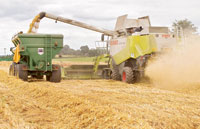Cereals 2010: Oxford Farming Conference sparks debate

The cut and thrust of debate that has made the Oxford Farming Conference famous will appear for the first time at Cereals 2010.
Organisers of the conference are working with the Cereals team to bring visitors a series of sessions on crop science and environmental protection.
A range of farmers, scientists, policymakers and environmentalists will discuss the topics over the two days at sessions sponsored by the BBSRC, HGCA and the RSPB.
“The OFC is really excited about teaming up with Cereals 2010 to run a conference at the event,” says Christine Tacon, OFC chairman. “It allows us to debate some of the arable sector’s big issues in an open and ‘all-welcome’ forum, with some influential leaders.
“The science session will explore where future R&D needs to be focused to meet the objectives of both farmers and the supply chain,” adds Ms Tacon, who is also managing director of Co-operative Farms. “The Campaign for the Farmed Environment session will tackle how the campaign is progressing and its commercial viability on arable farms.”
The sessions are free and open to all visitors and will run as debates, with questions welcomed from the audience. There will be science sessions on the morning of both days (see below) with the CFE coming under scrutiny in the afternoons.
The title of the science sessions is Science in the Arable Sector: Where are the ideas which are relevant to cereal production? “The key research priority for crops and livestock must be to increase efficiency of production,” says panellist and NFU president Peter Kendall.
“This will include reducing yield and quality losses from pests and diseases; increasing the efficiency with which plants and animals use fertilisers, water, nutrients, feed and sunlight, as well as increasing the usability of by-products.”
Susannah Bolton, head scientist at HGCA, says research and innovation in crop variety development can help growers take advantage of emerging markets and better target existing opportunities.
Ian Crute, head of science at the Agriculture and Horticulture Development Board, believes that UK farmers and researchers will have to address the challenge of increasing on-farm wheat and oilseed rape yields that have stalled over the past decade, despite the incremental increases in genetic potential of new varieties.
Former Farmers Weekly Farmer of the Year Adrian Ivory has three major science priorities – educating European regulators of the safety and need for pesticides; the development of varieties for a changing climate and more research in the UK and Europe into the possibilities of GM crops.
The environmental sessions are entitled: Campaign for the Farmed Environment: Is the campaign working and is it commercially viable?
“The Campaign for the Farmed Environment cannot have come at a more important time as it provides the ideal opportunity to tackle the issues,” says Natural England chairman Poul Christensen.
Mark Avery, director of conservation at the RSPB, believes the CFE has a key role in reversing the decline in bird numbers and delivering the aims of Entry Level Stewardship.
“It is vital that the CFE succeeds in improving ELS delivery to reverse farmland bird declines,” he says.
Aileen Kirmond, head of land quality at the Environment Agency believes that the CFE will play a major role in improving UK water quality and meeting looming Water Framework Directive goals. Rutland farmer and environmentalist Andrew Brown says the CFE provides farmers with the opportunity to show the public and policymakers they can deliver environmental benefits without the need for more regulation.
For more on The Oxford Farming Conference see www.ofc.org.uk
The Oxford Farming Conference Sessions at Cereals 2010, sponsored by BBSRC, HGCA and RSPB. Stand 434
Wednesday 9 June
11am
Science in the Arable Sector: Where are the ideas which are relevant to cereal production?
Panellists
Peter Kendall, president, NFU
Prof John Snape, head of crop genetics, John Innes Centre (BBSRC)
Dr Susannah Bolton, head scientist, HGCA
Senior representative of the Soil Association
Dr Mike Bushell, principal global scientific adviser, Syngenta
2.30pm
Campaign for the Farmed Environment: Is the campaign working and is it commercially viable?
Panellists
Poul Christensen, chairman, Natural England
Jim Egan, head of CFE delivery group
Mark Avery, director of conservation, RSPB
Ian Pigott, Hertfordshire farmer and commentator
Thursday 10th June
11am
Science in the Arable Sector: Where are the ideas which are relevant to cereal production?
Panellists
Prof Ian Crute, head of science, AHDB
Bill Clark, director, Brooms Barn (BBSRC)
Nick Mole, Pesticide Action Network
Adrian Ivory, Perthshire farmer and commentator
2.30pm
Campaign for the Farmed Environment: Is the campaign working and is it commercially viable?
Panellists
Aileen Kirmond, head of land quality, Environment Agency
Jim Orson, research and technical adviser, TAG
Andrew Brown, Rutland farmer and environmentalist
Robert Law, Cereals Event host farmer

